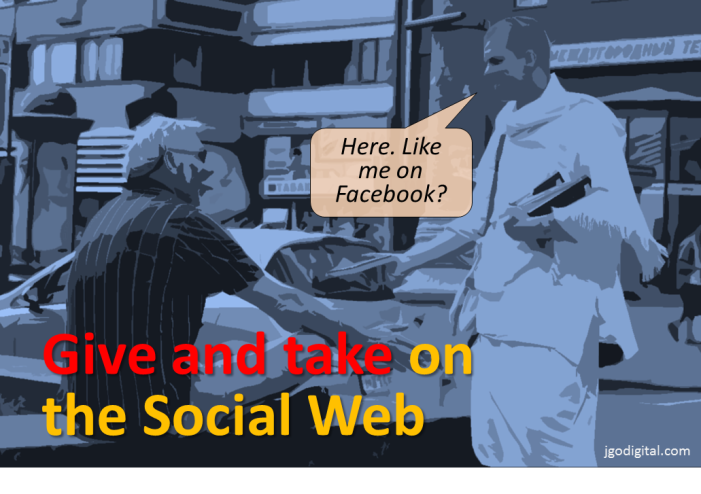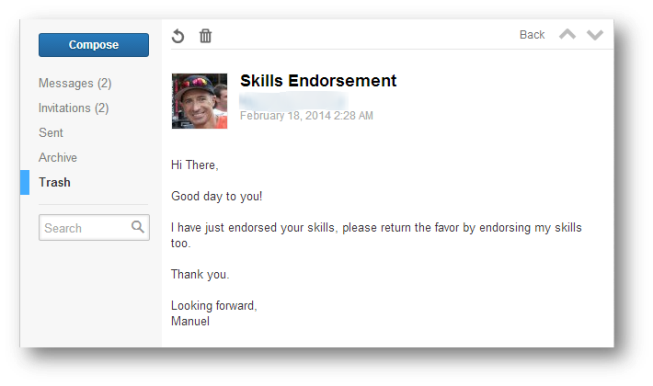Raise your hand if you’ve heard this social media marketing pearl: ‘You’ve got to give to get.’
It’s a common mantra of social media gurus today. The problem is too many followers meditate on only half of its meaning. In their hands it becomes a corrupted use of the reciprocity rule to influence others on social media.
The reciprocity rule, described by Robert Cialdini in his book Influence, says that “we should try to repay, in kind, what another person has provided us.” It has great power to persuade and manipulate others by creating a sense of obligation.
So strong is that power that people will return a favor even if it is an unwanted gift from someone they don’t know or like. The Hare Krishna Society funded a worldwide organization by using the reciprocity rule to get thousands of one-dollar donations from strangers.
In his chapter on reciprocity, Cialdini describes how they did it.
Krishna members would approach a stranger in a public place and give them a flower. They would, under no circumstances, take it back if the stranger tried to return it. Instead they would insist it was a gift and then ask for a donation. In most cases the pull of reciprocity was so strong the stranger would grudgingly give a donation for this “gift” only to throw it away at the nearest trash bin.
There is a lot of Hare Krishna giving on social networks today. See if this looks familiar to you.
I get one of these requests a week on LinkedIn. It’s always from someone in my network with whom I have never worked nor know personally. It proposes an exchange of favors that says ‘I gave you an endorsement, can I get one from you?’ It’s a classic Krishna ploy. But how effective is that at building influence on social media?
I think the time is ripe to revisit ‘give to get’ on the Social Web. For starters, let’s look at what some influence authorities are thinking about the reciprocity rule. (Some of these quotes come from Mark Schaefer’s book Return on Influence, which is definitely worth reading).
On reciprocity and social influence
“A person who violates the reciprocity rule by accepting without attempting to return the good acts of others is actively disliked by the social group. We will often give back more than we have received in the name of reciprocity.” – Robert Cialdini
“Whatever power structure exists on the Social Web is often built on a foundation of subtle indebtedness, an ability to create influence through an economy of favors.” – Mark Schaefer
“Strong business relationships on the Web are built on trust that is selfless … Have you ever seen a wedding gift sponsored by Nike? Have you ever had to watch a 30-second commercial before you were able to open a gift? These things are ludicrous in a social media context. If you expect people to help you just because you’ve helped them, you’ve got it all wrong.” – Mike Stelzner
“Give and it will be given to you: good measure, pressed down, shaken together, and running over will be put into your bosom. For with the same measure that you use, it will be measured back to you.” – Jesus Christ
“Getting coffee for someone is doing something nice. But get your mother-in-law some chicken soup while she’s sick, and she’ll tell the whole family how great you are. This is what the Web does all the time, but without any one individual doing the work. This is because all encounters in which you participate are recorded in public (blogs, Facebook, etc.) for others to see.” – Chris Brogan
“Reciprocity is one of the core tenets of building relationships. But there are people out there trying to pile on these little favors, and then you feel like you owe them for promoting your material, recommending your book, passing along links that help you one way or another. Then one day they ask you to return the favor in a way that you would not organically support. They’re trying to trade in on the idea that you owe them. That is not true influence because at some point I get resentful.” – Jason Falls
“Someday – and that day may never come – I’ll call upon you to do a service for me. But until that day, accept this justice as a gift on my daughter’s wedding day.” – Don Corleone
“The expression of reciprocity is definitely amplified on the Social Web. For those of us who see it as a business, we struggle against the notion of this constant obligation to return favors. It is actually the end of community. If you have to abide by a formula of reciprocity, you are trying to create authority that wasn’t earned. It’s not authority based on skill or how good you are at creating content, or how deep is your thinking. It’s actually an authority based on guilt and shame!” – Jay Baer
“Always go to other people’s funerals, otherwise they won’t go to yours.” – Yogi Berra
When ‘give to get’ works on social media
Don Corleone and Jesus are not making the same point about giving and reciprocity. It comes down to motivation. The ‘give to get’ principle is a reward for our actions, it should not be the driving motivation behind them. Giving, by definition, is to present something voluntarily without expecting compensation.
People on the receiving end understand this. When they are forced into feeling indebted, ‘give to get’ is reduced to a transparent manipulation. It turns your giving into a crude transaction. They may return the favor once, or they may not. Either way it nullifies the rule of reciprocity and diminishes its power.
The true power of reciprocity to influence others comes by stripping away the bald faced motivation to get something in return. Giving in a spirit of generosity inspires genuine appreciation and the willingness to return the favor.
Don’t give to get. Give to give. The rest will take care of itself.






















Speak Your Mind